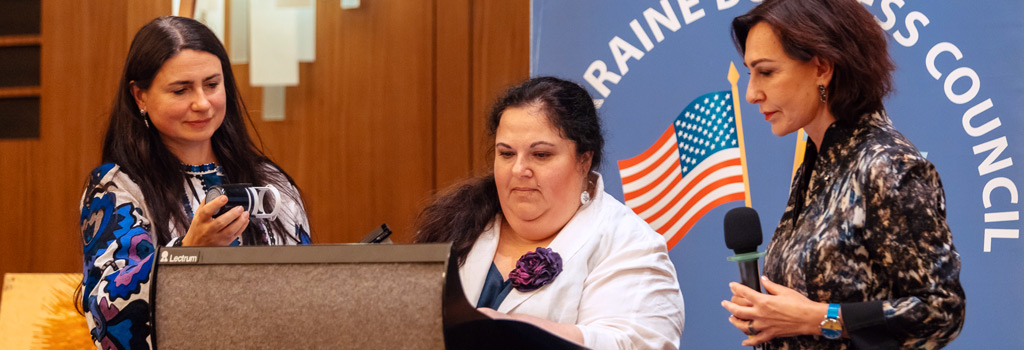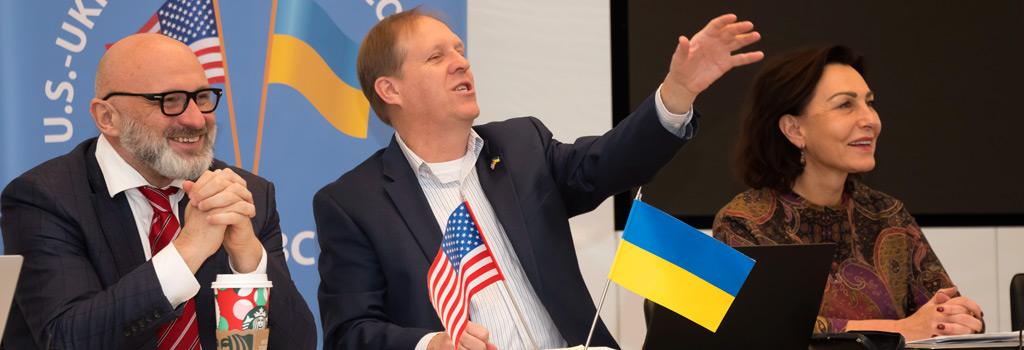Featured Galleries USUBC COLLECTION OF OVER 160 UKRAINE HISTORIC NEWS PHOTOGRAPHS 1918-1997
 Holodomor Posters
Holodomor Posters

Corporate governance crisis continues at
Ukraine’s state-owned enterprises
.jpg) By Anders Aslund, Senior Fellow, Atlantic Council
By Anders Aslund, Senior Fellow, Atlantic Council
Thu, April 15, 2021
Anders Aslund serves as a Senior Advisor to U.S.-Ukraine Business Council
Last fall, I resigned from the supervisory board of Ukrzaliznytsia (UZ), the Ukrainian state railway operator.
There were concrete reasons for this decision, such as not having been paid any salary for half a year and not receiving any liability insurance, but the problems go deeper. Unfortunately, I remain quite pessimistic about the likelihood of good corporate governance at Ukraine’s state-owned enterprises unless major changes are undertaken.
Managing large state-owned enterprises (SOEs) is unquestionably a difficult task. They are big, often monopolistic, important for public welfare, and typically politicized.
The problems in Ukraine are all the greater, because many are unreformed Soviet enterprises featuring diffuse property rights, a diverse range of non-core assets, poor financial management, old-style organization, massive over-staffing, and pervasive corruption.
The Organization for Economic Cooperation and Development (OECD) has adopted standard rules for corporate governance. As Ukraine’s Minister of Economic Development and Trade, Aivaras Abromavicius had a good law on corporate governance of SOEs based on those principles adopted in 2015. Today, nine Ukrainian SOEs and four state-owned banks have supervisory boards (typically with seven members).
One basic idea is that the management of SOEs should be detached from the branch ministries, so that they are not treated as ministerial departments. Therefore, SOEs should preferably be subordinate to the Cabinet of Ministers, the Finance Ministry, or the Ministry of Economic Development and Trade.
The most important decision of any company is the appointment of its CEO and the rest of the management board (six to eight people). Unfortunately, current Ukrainian law only entitles the supervisory board to nominate members of the management board, while the cabinet of ministers makes the actual appointments.
This is an untenable situation. In many cases, senior directors intrigue with ministerial staff behind the backs of the supervisory board, because they see the ministries as their real employers, and they are right to do so.
The sacking and appointment of senior managers must be the responsibility of the supervisory board. Repeatedly, supervisory boards receive government proposals for the appointment of senior managers. Unfortunately, these candidates are often incompetent or corrupt. This is exactly what a government should not be doing.
The second key responsibility of a supervisory board is to adopt the company’s annual financial plan, its main economic program. Also in this case, a supervisory board only proposes a financial plan, while the Cabinet of Ministers decides. This not only undermines the responsibility of the supervisory board, but also leads to delays of several months, since various ministers have to agree upon proposed plans. Without an authorized financial plan, an SOE is not entitled to carry out any capital expenditures, which means no investment can be done during the first half of each year, leaving the investment process in tatters.
A key aim of the introduction of independent supervisory boards at SOEs was to stop pervasive corruption. Ukrainian governments have always seen SOEs as cash cows able to deliver benefits to the government or its loyalists. This politicization takes many forms. Traditionally, favored politicians, usually parliamentarians, have tapped SOEs for money through transfer pricing and favored public procurement.
Naftogaz was an outstanding example of this culture, but it was cleaned up after 2014. As a result, it is now coming under attack because it no longer serves its former function. Other bad examples include Centrenergo and Energoatom, where old practices thrive due in part to the absence of supervisory boards.
Under Yanukovych, annual state subsidies to SOEs were about eight percent of GDP. Today, by contrast, SOEs hardly receive any state subsidies. That is an indication of the gains Ukraine can enjoy from the implementation of pretty elementary corporate governance.
Needless to say, the former beneficiaries are furious. They actively seek to reverse reforms. These steps include calls for the minimization of salaries of managers and supervisory board members in order to scare competent and honest people away, so that the old corrupt ways could be revived.
In some instances, opponents of reform also accuse supervisory board members of their own corruption, as recently happened at UZ. Unfortunately, this approach remains possible as Ukraine still suffers from many law enforcement agencies that are vulnerable to exploitation in order to oppose the rule of law.
Compounding these problems, the current Ukrainian government has shown no belief in good corporate governance. Instead, critics accuse the authorities of seeking to appoint friends and secure personal benefits. Many supervisory board members have noted these negative trends and left. Until this disregard for the principles of good corporate governance changes, Ukraine’s SOEs will continue to struggle.
Anders Åslund was a member of the supervisory board of Ukrzaliznytsia (UZ) from 2018-2020.
LINK: https://www.atlanticcouncil.org/blogs/ukrainealert/corporate-governance-crisis-continues-at-ukraines-state-owned-enterprises/

















